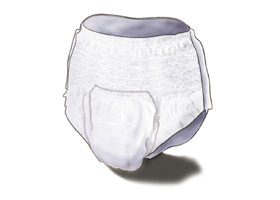 Researchers from the VA Medical Center in Minneapolis, Minnesota reviewed treatments for nursing home residents with urinary incontinence.
Researchers from the VA Medical Center in Minneapolis, Minnesota reviewed treatments for nursing home residents with urinary incontinence.
Prompted voiding used alone and combined with exercise were associated with modest short-term improvement in daytime urinary incontinence.
Prompted voiding is a behavioral technique used in dependent or cognitively impaired people to teach awareness of their incontinence and request toileting assistance, either independently or after prompting by a caregiver.
First, the details.
- A review of the literature revealed 14 studies of 1161 patients.
- All patients were nursing home or long-term institutionalized residents with urinary incontinence.
- Treatments included antimuscarinic drugs (eg, oxybutynin, Ditropan), oral estrogen plus progesterone, and behavioral intervention (prompted voiding).
- All studies compared treatment to a control group and included comparisons of incontinence outcomes and/or adverse events.
And, the results.
- Compared to usual care, prompted voiding alone or with exercise reduced daytime incontinence and increased appropriate toileting.
- Neither prompted voiding + exercise nor prompted voiding + oral estrogen and progesterone was better than prompted voiding alone for incontinence management.
- Prompted voiding + oxybutynin slightly reduced incontinence compared to prompted voiding + placebo.
The bottom line?
The results were positive for prompted voiding in the short term.
The authors also concluded, “Results do not clearly support an independent effect of exercise in improving urinary incontinence. Oxybutynin may provide small additional benefit when used with prompted voiding. There appears to be no role for oral estrogen in urinary incontinence treatment.
A protocol for prompted voiding is described here.
12/3/08 18:17 JR